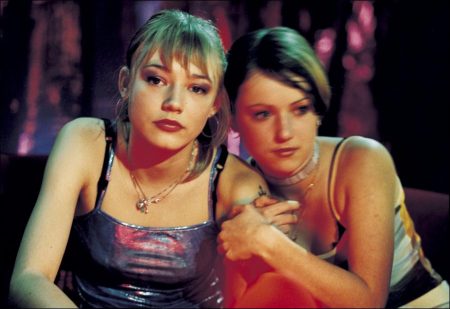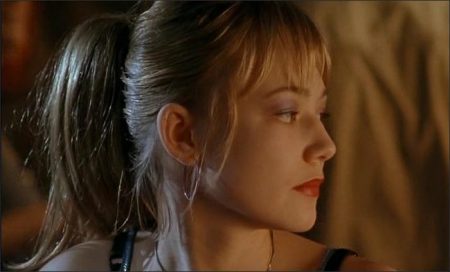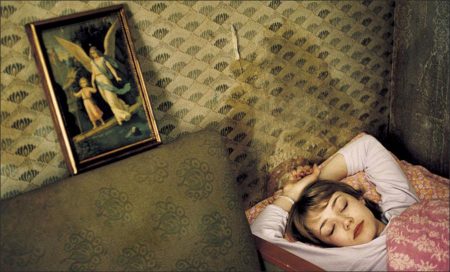Lilya 4 Ever Movie Trailer. There is something remarkable about Lukas Moodysson’s ability to keep us in our seats for a movie that’s as relentlessly bleak as his latest, “Lilya 4-Ever.” That doesn’t sound like much of a recommendation, but one of the things that separates real movie lovers from casual admirers is an ability (and a desire) to suck up the hardest-won cinematic pleasures, not just the easiest. I can’t think of another good movie this year that’s as tough to watch as Moodysson’s, but, then, I can’t think of very many movies that are as good.
Everything bad that could happen does happen to Lilya (Oksana Akinshina), who’s junked first by her mother and then by the world. When the movie opens, the 16-year-old is living with her family in an unnamed urban slagheap somewhere in the former Soviet Union (it’s actually a forsaken corner of Estonia).
Despair hangs over the block apartment buildings and eerily depopulated streets but not over Lilya. Along with her mother (Ljubov Agapova) and her mother’s boyfriend, the teenager has her sights set on a brand-new life in the United States. It’s a dream but it’s also a weapon, one that Lilya uses on a sneering store clerk and recklessly brandishes at her friends. “I’m going,” she gloats, “to America.”
She couldn’t be more wrong. We know this because in our first glimpse of Lilya, she’s running through a European city as if her life depended on it. It’s three months into the future and, although we don’t yet know her name, we can see she’s a fugitive. Out of breath, her face disfigured by animal fear, the girl runs and runs before coming to a stop. (The creepy metal-band dirge on the soundtrack sounds like it’s hounding her.)
Then the image freezes and she’s staring dreamily into the distance. It’s no accident that her faraway look mirrors that of the young runaway at the close of François Truffaut’s “The 400 Blows.” But unlike Truffaut’s Antoine Doinel, whose fate opened into charming adventure, Lilya faces no such promise.
We discover just how little promise over the course of three anguished months. In the extended flashback that constitutes most of the story, Lilya is abandoned by her mother and the thuggish boyfriend, who leave her alone in their apartment with lies and too little cash. She’s subsequently evicted from her home and forced into a fetid apartment, where she sleeps on the mattress where the former tenant died.
She’s subjected to physical abuse and unspeakable cruelty. She lives on cigarettes, potato chips and the fumes of the glue that she sometimes sniffs with a younger boy, Volodya (Artiom Bogucharskij). Just when you don’t think it can get any worse, she tags along to a nightclub where men cruise for girls willing to step into back rooms for cash.
The film is almost too painful to watch and, at the same time, impossible not to, which is the point. The girl duped or coaxed into prostitution is a modern cliché and, in its outlines, Lilya’s story doesn’t play differently from those of other girls we’ve seen on the news. Like the picture of the starving kid in the magazine, the one with the swollen belly and a face covered in flies, the image has become numbingly familiar. We are overwhelmed by images of other people’s misery. It can be difficult to care about one individual, especially when faced with the world of hurt that is beamed to us on a continuous basis.
Moodysson, a young Swede who directed “Show Me Love” and “Together,” has a ferocious spirit. His new film may be rough going, but what he’s attacking is nothing less than our numbing sense of helplessness, which too often hardens into apathy. What happens to Lilya is a cliché, but Moodysson wants us to see that there’s a real person under the platitudes, the bad breaks and the heartbreakingly foolish judgment calls.
His unwavering single-mindedness, which carries over into a propulsive and claustrophobic filmmaking style, can be exhausting. There’s a kind of perverse purity in his refusal to flinch at Lilya’s tribulations, but there are moments in the film, as when she falls literally into the mud after her mother leaves, which seem not just overwrought but unnecessary.
What is it about male directors and the agonies of young girls? Lilya belongs to a long tradition of beautiful girls who suffer at the hands of male directors, beginning with D.W. Griffith and continuing on to Jean-Pierre and Luc Dardenne with “Rosetta.” Like Robert Bresson’s little Mouchette, among the most desperate of all these girls, Lilya endures a crucible of suffering.
But there’s a more overtly political dimension to Lilya’s torment since Moodysson has dedicated his film to the “millions of children around the world exploited by the sex trade.” As even the dedication makes clear, this isn’t for everyone who found happy refuge in his earlier features but, like all good movies, it possesses an artistry that helps the film transcend the bleakness of its subject. This isn’t an easy film — only a memorable one.
Lilya 4 Ever (2003)
Lilja 4 Ever
Directed by: Lukas Moodysson
Starring: Oksana Akinshina, Artyom Bogucharsky, Lybulov Agapova, Liliya Shinkaryova, Elina Benenson, Pavel Ponomaryov, Anastasiya Bedredinova, Yevgeni Gurov
Screenplay by: Lukas Moodysson
Cinematography by: Ulf Brantas
Film Editing by: Michal Leszczylowski, Oleg Morgunov, Bernhard Winkler
Costume Design: Denise Östholm
Art Direction by: Josefin Åsberg
Makeup Department: Jessica Cederholm, Kristina Olsson
Music by: Nathan Larson
Ristributed by: Newmarket Films
Release Date: August 23, 2002 (Sweden), September 27, 2002 (Denmark), April 18, 2003 (United States)
Views: 245






